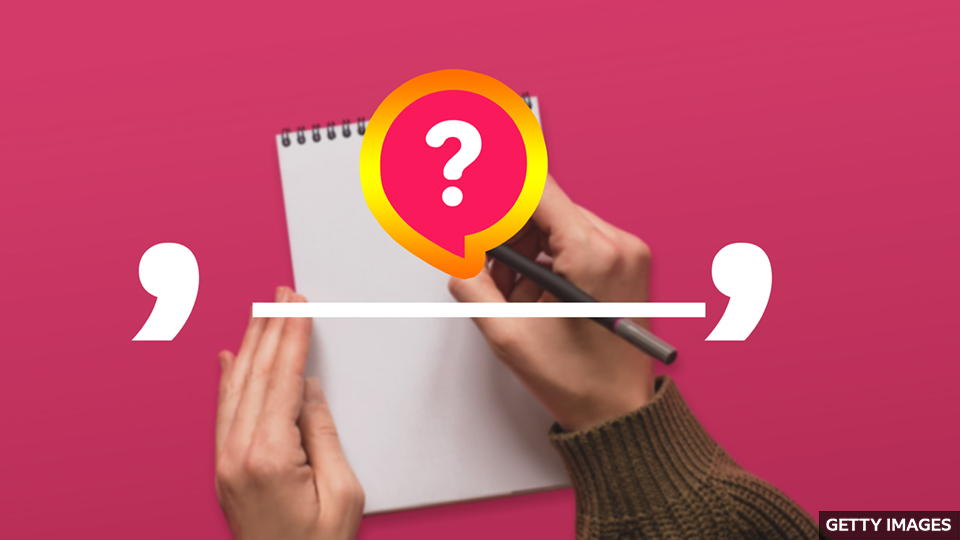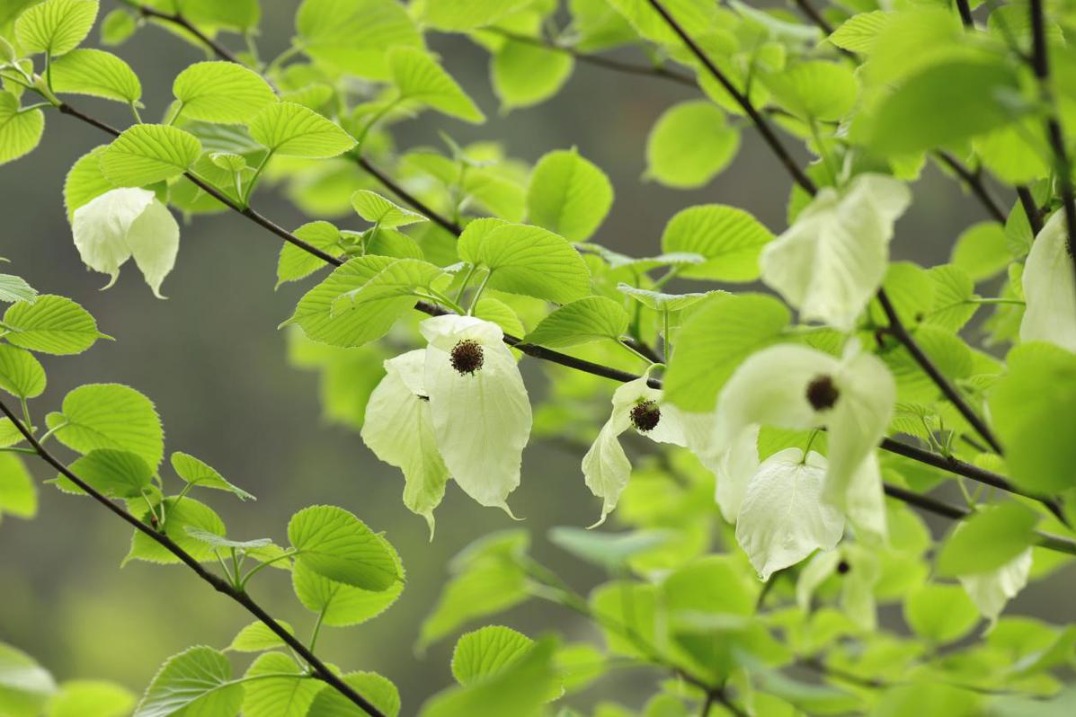你问我答
英语逗号之间的部分都是插入语吗?

内容简介
你知道英语中逗号的用法吗?一位听众来信询问两个逗号中间的部分是否一定是 “parenthesis(插入语)”。插入语在句中起到注释、添加信息的作用,而且可以被省略。除了逗号以外,还有哪些标点符号能用在插入语的两边?听 “你问我答” 节目讲解相关知识点。
文字稿
(关于台词的备注: 请注意这不是广播节目的逐字稿件。本文稿可能没有体现录制、编辑过程中对节目做出的改变。)
Jiaying
大家好,欢迎收听 BBC英语教学的 “你问我答” 节目。I'm Jiaying.
Phil
And I'm Phil. We've got a question from one of our listeners:
Question
我想问一下,一篇英语文章或一个段落里,如果句子中前面一个逗号,后面一个逗号,那这都算是 “插入语” 吗?
Phil
This is an interesting question. It's about how we organise information in a sentence and how we use punctuation.
Jiaying
这个问题除了和组织语句中的信息和标点符号的使用有关以外,还提到了英语中的插入语 “parenthesis”。“插入语” 指 “在句子中插入一个词、短语或从句,从而起到注释、添加信息的作用”。
Phil
And as the question mentioned, we often use a pair of commas to separate it, though we can also use brackets or dashes in a similar way.
Jiaying
通常情况下,你会看到插入语的前后各有一个用来把它与句子的其它部分隔开的逗号。除了逗号以外,我们有时也可以用圆括号或破折号来起到同样的作用。来听两个例句。注意:句子中使用逗号的地方会稍作停顿。
Examples
The train, which is often late, left on time.
(这列经常晚点的火车准时发车了。)
Maria, who was wearing a bright yellow swimsuit, swam back to the beach.
(穿着一件亮黄色泳衣的玛丽亚游回了海滩。)
Jiaying
在第一个例句中,“The train left on time.” 是句子的主干,句中的插入语是 “which is often late”。它起到了添加信息的作用,可以直接省略,并不影响句子主干的含义。
在第二个例句中,“Maria swam back to the beach.” 是句子的主干,插入语是 “who was wearing a bright yellow swimsuit”,同样起到了添加信息的作用。
Phil
Here, we used commas to separate these clauses from the rest of the sentence.
Jiaying
上面我们介绍了什么是插入语。接下来,我们说一说如果句子中的某个部分前后各有一个逗号,那这个部分一定是插入语吗?
Phil
The answer is not necessarily. Commas have a few different uses, so you will find things between two commas that are not a parenthesis.
Jiaying
由于英语中,逗号有很多用处,因此一句话中的两个逗号之间并不一定是上面我们讲到的插入语。
除了插入语以外,句子中的两个逗号之间的部分还可能是所列举的多个人或事物之一。注意:根据句意以及在句子中的位置不同,列举的倒数第二个和最后一个人或事物之间的逗号后通常会使用连词 “and” 或 “or”。
Phil
We can use listing commas between individual nouns, like items on a shopping list – I need to buy chicken, rice, and a cake.
Jiaying
这里,名词 “rice” 的两旁都有逗号。这里的逗号分隔的是名词。
Phil
But they're not just used with lists of individual nouns: the items in the list can be clauses. Listen to these examples, and we're adding pauses to indicate where the commas are.
Examples
Atul is cooking chicken, Paul is boiling rice, Sergei is making a cake and I'm getting hungry.
(阿图尔在做鸡肉,保罗在煮米饭,谢尔盖在做蛋糕,我饿了。)
We all have different hobbies: Mia plays football, Nathan paints with watercolours, Jessica goes rock climbing and Yassin makes films.
(我们都有不同的爱好:米娅踢足球,内森画水彩画,杰西卡攀岩,亚辛拍电影。)
Jiaying
“Paul is boiling rice” 和 “Nathan paints with watercolours” 前后都有所停顿,这是为了突出两个部分前后都使用了逗号,但它们都不是插入语,因此不能省略。
Phil
Another way that we can use commas is when we leave out things that we've already said to avoid repetition.
Jiaying
没错,还有一种两个逗号间并不是插入语的情况:我们会用逗号来表示省略上文已经提及的部分,从而避免重复。听两个例句。
Examples
Mornings are the perfect time to get work done, and afternoons, for relaxing.
(早上是完成工作的最佳时间,下午是放松的最佳时间。)
Swimming exercises your whole body, but running, just your legs.
(游泳锻炼你的全身,而跑步只锻炼你的腿部。)
Jiaying
在上面的两个例句中, “and afternoons” 和 “but running” 的两边都使用了逗号,但它们都不是插入语,因此不能省略。
拿第一个例句来说,“and afternoons” 后面的逗号代替了上文已经提及的同义部分,完整的句子应该是:“Mornings are the perfect time to get work done, and afternoons are the perfect time for relaxing.”
Phil
There are a number of different reasons that we use commas. Where a combination of these apply to a sentence, phrases and clauses can end up between two commas.
Jiaying
如果一句话中有多于一个逗号,且逗号的作用不同,那么就有可能出现某个部分两边各有一个逗号、却不是插入语的情况。听两个例句。
Examples
Additionally, we need to buy eggs, milk and bread.
(此外,我们还需要买鸡蛋、牛奶和面包。)
I walked to the shop, and I bought eggs, milk and bread.
(我走到商店,买了鸡蛋、牛奶和面包。)
Jiaying
在第一个例句中,“we need to buy eggs” 前后各有一个逗号。这是因为句首的 “additionally” 后需要加逗号,以及 “eggs” 的后面还需要列举其它的事物,所以有第二个逗号。
Phil
In the second example, there's a comma before 'and' because it's joining two independent clauses, and one after 'eggs' because it's part of a list.
Jiaying
在英语中,一个句子中的两个逗号之间的部分的确可能但并不一定是插入语。可能有不同的因素造成了句子中的某个部分两边均有逗号的情况。
Phil
We hope that's answered the question. And if you have question that you'd like us to answer, you can email us too at: questions.chinaelt@bbc.co.uk
Jiaying
你也可以通过微博私信的方式联系我们,我们的微博账号是 “BBC英语教学”。Bye!
Phil
Bye.



